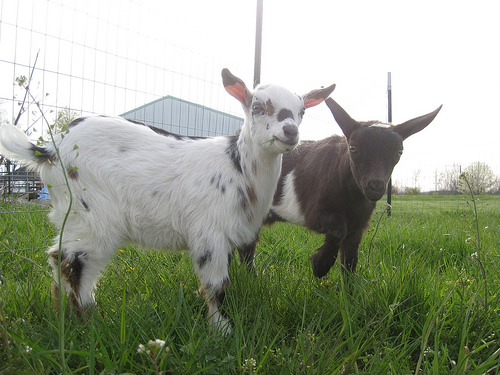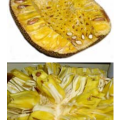Indigenous Worm Control Options for Goats

To alleviate these problems, farmers generally avoid grazing their animals on rainy days, or in the early hours of the morning when the sun has not yet dried the dew. Some raisers may confine their animals in pens during the whole rainy season. Others may give their animals a drench with a chemical dewormer, adopt a rotational pattern of grazing, or feed their animals the leaves of trees and shrubs which are known to have antihelminthic properties (i.e. they can rid the body of parasitic worms).
Plant Species Which Control Worms
In view of the cost of chemical dewormers and the preference of consumers for organically produced goats, most farmers resort to traditional ways of tackling worm problems. These include giving a drench of soy sauce, or feeding animals with the leaves of Madre Cacao (Gliricidia sepium), custard apple (Anona squamosa), jackfruit (Artocarpus heterophylus) or the Manila tamarind (Pithecellobium dulce). Farmers may also feed their animals on the leaves and young seeds of ipil-ipil (Leucaena sp.), and the stems and leaves of the sow thistle (Streblus asper).
Drench of Soy Sauce
This drench is the common soy sauce, made from a mixture of soybean extract, water, iodized salt, natural caramel color and 0.1% sodium benzoate. If farmers observe signs of parasitism in their animals, they may apply as a drench a bottle of about 350 ml soy sauce (per animal) to cattle and buffaloes. Goats are given about half this amount.
Tree Leaves and Shrubs
The fresh leaves of jackfruit, Leucaena, Gliricidia, Manila tamarind and sow thistle are fed ad libitum for at least one week, along with other fodder species. Sow thistle stems, are also used, but are boiled first, and the liquid applied as a drench once a day. In the same way, jackfruit leaves are also boiled and the liquid given orally. The jackfruit preparation is given again after a week. Young pods of Leuceana are given ad libitum when they are available.
Effectiveness
According to farmers in the Philippines, all these methods help to reduce, if not control, parasite loads in their animals, especially in goats. For one thing, leaves from shrubs and trees are often free from infective larvae, since they grow too high and are too dry for larval survival. Moreover, leaves of the plants listed above are known to have anthelmintic properties.
An analysis of goat manure carried out by a diagnostic laboratory in Cebu, Philippines, showed zero worms (eggs per gram) after the tree leaves and shrubs were given to the goats. Whether the effect is due to better nutrition or the actual effect of the practice on the parasite is difficult to know. But one thing is sure – these practices certainly helped reduce parasitic infections in goats.
Philippine Council for Agriculture, Forestry and Natural Resources Research and Development, Los Banos, Laguna, Philippines 4030 Fax: (63 49) 536 0016
Source: http://www.agnet.org/library.php?func=view&id=20110729103648&type_id=7






